
"Burning Love" is a 1972 song by Elvis Presley, written by Dennis Linde, originally released by Arthur Alexander earlier in 1972. Presley found major success with the song, it becoming his final Top 10 hit in the American Hot 100 or pop charts, peaking at number 2.

"Jailhouse Rock" is a rock and roll song recorded by American singer Elvis Presley for the film of the same name. It was written by Jerry Leiber and Mike Stoller. RCA Victor released the song on a 45 rpm single on September 24, 1957, as the first single from the film's soundtrack EP. It reached the top of the charts in the U.S. and the top 10 in several other countries. The song has been recognized by the Grammy Hall of Fame, the American Film Institute, and others.

"Promised Land" is a song lyric written by Chuck Berry to the melody of "Wabash Cannonball", an American folk song. The song was first recorded in this version by Berry in 1964 for his album St. Louis to Liverpool. Released in December 1964, it was Berry's fourth single issued following his prison term for a Mann Act conviction. The record peaked at #41 in the Billboard charts on January 16, 1965.
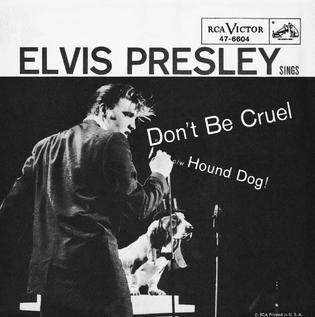
"Don't Be Cruel" is a song that was recorded by Elvis Presley and written by Otis Blackwell in 1956. It was inducted into the Grammy Hall of Fame in 2002. In 2004, it was listed #197 in Rolling Stone's list of 500 Greatest Songs of All Time.

On Stage is a live album by American singer Elvis Presley, released by RCA Records in June 1970. It was recorded between February 17 and 19, 1970 and August 22 and 25, 1969 at the International Hotel, Las Vegas, Nevada. The album reached number 13 on both the Billboard 200 and country music charts. It was certified Gold on February 23, 1971, and Platinum on July 15, 1999, by the Recording Industry Association of America.
"Love Letters" is a 1945 popular song with lyrics by Edward Heyman and music by Victor Young. The song appeared, without lyrics, in the film of the same name released in October 1945. A vocal version by Dick Haymes, arranged and conducted by Young, was recorded in March 1945 and peaked in popularity in September. "Love Letters" was subsequently nominated for the Academy Award for Best Original Song in 1945, but lost to "It Might as Well Be Spring" from State Fair.

"Stuck on You" was Elvis Presley's first hit single after his two-year stint in the US Army, reaching number one in 1960 in the US.
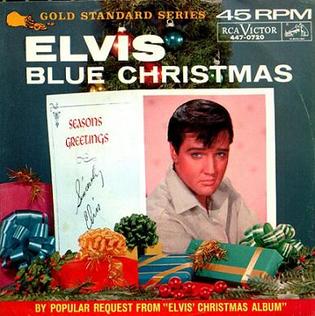
"Blue Christmas" is a Christmas song written by Billy Hayes and Jay W. Johnson and most famously recorded by Elvis Presley, although it was first recorded by Doye O'Dell in 1948. It is a tale of unrequited love during the holidays and is a longstanding staple of Christmas music, especially in the country genre.
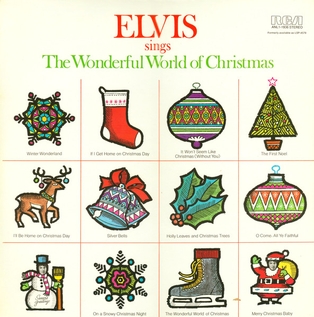
Elvis Sings The Wonderful World of Christmas is the fifteenth studio album by American singer Elvis Presley, released in October 1971. It was his first Christmas album with new recordings since Elvis' Christmas Album (1957). The album's single, "Merry Christmas Baby" / "O Come All Ye Faithful", was later released in November 1971. This album was a top seller and topped the Christmas LP's chart; it would have charted high on the Billboard Top LPs chart, but from 1963 to 1973, holiday albums were not allowed to chart. Though lacking the commercial appeal of Elvis' first Christmas album, it gradually become a perennial favorite. The album was certified Gold on November 4, 1977, Platinum on December 1, 1977, 2× Platinum on May 20, 1988, and 3× Platinum on July 15, 1999, by the RIAA.
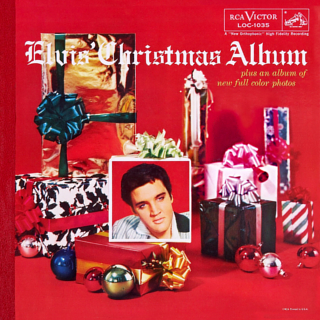
Elvis' Christmas Album is the third studio album and first Christmas album by American singer and musician Elvis Presley on RCA Victor, LOC -1035, a deluxe limited edition, released October 15, 1957, and recorded at Radio Recorders in Hollywood. It has been reissued in numerous different formats since its first release. It spent four weeks at No. 1 on the Billboard Top Pop Albums chart, and was the first of two Christmas-themed albums Presley would record, the other being Elvis Sings the Wonderful World of Christmas, released in 1971. The publication Music Vendor listed Elvis' Christmas Album on their singles charts for two weeks in December 1957 – January 1958, with a peak position of No. 49.

"I Forgot to Remember to Forget" is a 1955 rockabilly and country song, first recorded by Elvis Presley and written by Stan Kesler and Charlie Feathers. It was Elvis' first no. 1 record nationally. The single was the fifth and final single released on Sun Records before Elvis moved to RCA Records.

"Wear My Ring Around Your Neck" is a song written by Bert Carroll and Russell Moody, performed by Elvis Presley, which was released in 1958. It was particularly notable for breaking a string of ten consecutive number 1 hits for Presley achieved in just two years. Although it was Presley's 6th number-one hit in the American R&B Charts, it only peaked at number 2 on the American Pop Charts.
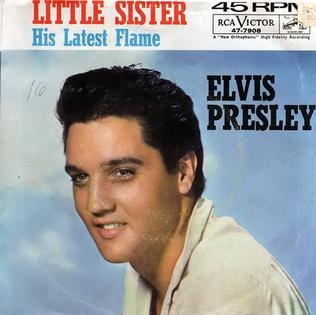
"Little Sister" is a rock and roll song written by Doc Pomus and Mort Shuman. It was originally released as a single in 1961 by American singer Elvis Presley, who enjoyed a No. 5 hit with it on the Billboard Hot 100. The single also reached No. 1 in the UK Singles Chart. Lead guitar was played by Hank Garland and the rhythm guitar was played by Scotty Moore with backing vocals by the Jordanaires featuring the distinctive bass voice of Ray Walker.

Christmas Duets is a 2008 album released by RCA Records, consisting of archival Elvis Presley vocal recordings mixed with completely re-recorded instrumentation and new vocals by contemporary country and gospel singers. Three tracks on the album do not have duet vocals: "The First Noel", "If I Get Home On Christmas Day", and "Winter Wonderland". However, the instrumental tracks for these songs were re-recorded by contemporary musicians, just like on all other songs. Martina McBride and Carrie Underwood duets have both charted on the Billboard country charts, with the former reaching the Top 40.

"T-R-O-U-B-L-E" is a song written by Jerry Chesnut and recorded by Elvis Presley in March 1975. It was released as a single, as the A-side, with the B-side "Mr. Songman", through RCA Victor that was taken from his album Today. It is not to be confused with the Leiber and Stoller song "Trouble", that Presley first recorded in July 1958, and which was subsequently recorded by numerous other artists.

Fun in Acapulco is the seventh soundtrack album by American singer and musician Elvis Presley, released on RCA Victor Records in mono and stereo, LPM/LSP 2756, in November 1963. It is the soundtrack to the 1963 film of the same name starring Presley. Recording sessions took place at Radio Recorders in Hollywood on January 22 and 23 and February 27, 1963; and at RCA Studio B in Nashville, Tennessee, on May 26 and 28, 1963. It peaked at number three on the Billboard Top Pop Albums chart.

"Bossa Nova Baby" is a song recorded by Elvis Presley on January 22, 1963, at Radio Recorders in Hollywood, California as part of the soundtrack of the 1963 motion picture Fun in Acapulco. It was released as a single that year reaching the top ten in the US. It was written by Jerry Leiber and Mike Stoller.

Clambake is the sixteenth soundtrack album by American singer and musician Elvis Presley, released by RCA Victor in mono and stereo, LPM/LSP 3893, in October 1967. It is the soundtrack to the 1967 film of the same name starring Presley. He entered RCA Studio B in Nashville, Tennessee on February 21, 1967, for recording sessions for his twenty-fifth film. Supplemental material sessions took place on September 10 and 11, 1967. It peaked at number 40 on the Billboard 200.

"U.S. Male" is a song by Jerry Reed, recorded for his 1967 debut album The Unbelievable Guitar and Voice of Jerry Reed.

"I Can't Help It (If I'm Still in Love with You)" is a song written and originally recorded by Hank Williams on MGM Records. It hit number two on the Billboard country singles chart in 1951. In his autobiography, George Jones printed the first six lines of the song and stated, "Its lyrics couldn't be more simple - or profound."


















